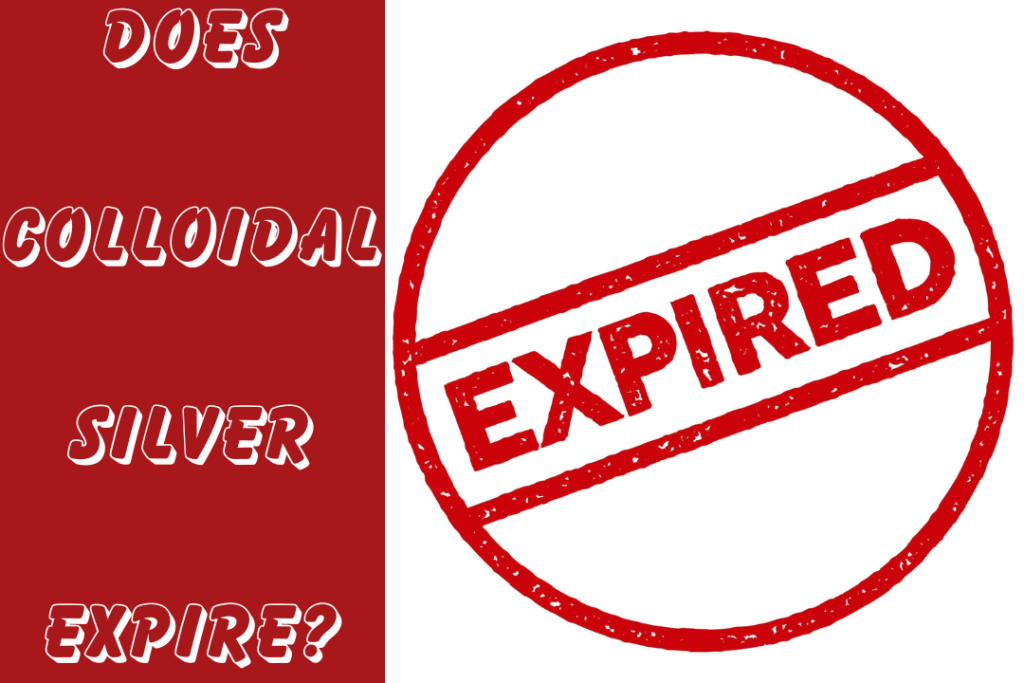Colloidal silver has become increasingly popular as a natural health remedy, attributed to its unique antimicrobial properties. However, it’s important to note that like many other products, colloidal silver does have a finite shelf life. Here, we will discuss the subject of colloidal silver expiration, examine the indicators of expired colloidal silver, potential hazards, and appropriate methods of its storage.
What is Colloidal Silver?
Firstly, we should know the basics of colloidal silver. Colloidal silver is a solution that consists of tiny silver particles dispersed in a liquid, mostly water. It has a long history of use due to its antibiotic properties. In contemporary times, colloidal silver is commonly employed in alternative medicine and as a dietary supplement.
The History Of Colloidal Silver
Do you know the history of colloidal silver? Well, we are here to inform you:
Ancient Times And Traditional Uses
Colloidal silver was first used in ancient times, with its origins dating back 1000s of years. It was first employed by ancient civilizations such as the Egyptians and Romans for its perceived medicinal properties and preservation capabilities.
Egyptian And Roman Eras
In ancient Egypt, silver was highly regarded for its medicinal properties and was used to store water and other liquids to prevent spoilage. The Roman Empire also utilized silver containers to preserve perishable foods and beverages.
19th And Early 20th Century
During the late 19th and early 20th centuries, silver compounds were incorporated into medical practices. For example, Silver nitrate was used as a disinfecting agent for wounds and as an eye drop to prevent infections in newborns.
Silver In Dentistry
Silver amalgam, a mixture of silver, mercury, and other metals, became widely used in dentistry for dental fillings due to its durability and disinfectant properties.

Contemporary Usage And Debate
Health Supplement And Alternative Medicine
Colloidal silver is now commonly marketed as a health supplement or alternative medicine product. It is often consumed orally in the form of (Colloidal Silver Water), applied topically in the form of (Colloidal Silver Aloe Vera Gel) or used in the form of sprays such as (Colloidal Silver Spray).
Debate And Scientific Research
Millions of people are debating on the uses and effects of colloidal silver since its existence. Critics argue that there is insufficient scientific evidence to support its effectiveness and express concerns over potential side effects, such as argyria—a condition causing a bluish-gray discoloration of the skin.
Regulatory Considerations
Regulatory bodies, including the U.S. Food and Drug Administration (FDA) and the European Medicines Agency (EMA), have issued warnings and restrictions on the promotion and sale of colloidal silver products, emphasizing the need for scientific evidence and caution regarding usage.
Despite the ongoing debate and regulatory scrutiny, colloidal silver continues to be used by individuals, seeking alternative health solutions.
How Long Does Colloidal Silver Last?
Well, one of the most important questions asked about colloidal silver is, how long does it last. If we talk about the life of colloidal silver, it can last as long as 10 years if stored correctly. But if we talk about how long does it last in the body, then according to the Researchers of Chemical Technology, the attainment of genuine colloidal silver occurs when the dimensions of the silver colloid range from 1 to 100 nanometers. These particles are expelled from the body within a period of 6 to 8 hours, ensuring the safety of its usage for individuals of all ages, including adults, children, and even pets.
Understanding Expiration Dates
Knowing the expiration date of the products is necessary for consumer safety and the product’s effectiveness. Expiration dates indicate the period during which a product is expected to retain its quality and potency. Colloidal silver is no exception, and it is crucial to pay attention to the expiration dates printed on the packaging.
Does Colloidal Silver Expire?
Yes, colloidal silver does expire. Over time, the silver particles in the suspension may degrade and reduce their efficacy. Expired colloidal silver may not provide the same antimicrobial benefits as fresh one, and using the expired one can potentially lead to health risks.
Determining The Expiration Of Colloidal Silver
Factors Affecting Expiration
Determining the expiration date of colloidal silver involves considering several factors. The quality and purity of the silver used in the product significantly impact its shelf life. Higher quality silver and a higher level of purity tend to result in a longer expiration date. Additionally, the particle size and concentration of the silver particles in the suspension play a role. Smaller particle sizes and higher concentrations often contribute to a longer shelf life.
Container Material And Light Exposure
The type of container used to store colloidal silver can also influence its expiration. Dark glass or opaque containers provide better protection against light exposure, which can degrade the silver particles over time. Transparent or plastic containers are more susceptible to light penetration, potentially reducing the shelf life of colloidal silver.
Effects Of Expired Colloidal Silver
Obviously, there are several effects of expired colloidal silver like other products:
Reduced Efficacy
Expired colloidal silver definitely loses its potency and effectiveness. The silver particles in the suspension degrade, making the product less capable of providing its benefits. Using expired colloidal silver does not produce the desired results and could lead to disappointment in its efficacy.
Potential For Bacterial Growth
As colloidal silver reaches its expiration, there is an increased risk of bacterial growth in the solution. Bacteria can thrive in an environment where the antimicrobial properties of colloidal silver have diminished. It is strictly warned to avoid using expired colloidal silver to prevent potential contamination and health risks.
Health Risks And Side Effects
Using expired colloidal silver may pose certain health risks and side effects. The presence of bacteria or other contaminants in expired colloidal silver can lead to infections or adverse reactions. It is essential to prioritize safety and dispose of expired colloidal silver to minimize any potential harm.
Storage And Handling Tips
Some tips to store and handle the product by professionals:
Proper Storage Conditions
To maximize the shelf life of colloidal silver, it is important to store it under appropriate conditions. A cool and dark environment is ideal for maintaining the stability of colloidal silver. Direct exposure to sunlight, heat sources, and high humidity should be avoided, as they can accelerate the degradation process.
Avoiding Contamination
Maintaining the purity of colloidal silver is crucial for its effectiveness. It is recommended to use clean utensils when handling colloidal silver to prevent contamination. Additionally, ensuring that the container is tightly sealed after each use can help minimize the introduction of foreign particles or microorganisms.
Handling Precautions
When handling colloidal silver, it is advisable to follow basic hygiene practices. Washing hands thoroughly before and after use can help minimize the risk of introducing bacteria or contaminants. Additionally, avoiding direct contact between colloidal silver and surfaces that may harbor harmful substances is important to preserve its integrity.
Need a Colloidal Silver? Check out below:
When To Discard Colloidal Silver
Know when you should discard the product:
Time-Based Expiration
Every item in the market comes with its expiration date. Likewise, colloidal silver also comes with a recommended expiration date provided by the manufacturer. It is important to adhere to this timeline and discard the product once it reaches or exceeds its expiration date. Using colloidal silver beyond its recommended shelf life may result in reduced effectiveness and potential health risks.
Changes In Appearance And Odor
Apart from relying solely on the expiration date, it is crucial to pay attention to any noticeable changes in the appearance and odor of colloidal silver. If the liquid turns dark, cloudy, or develops an unusual smell, it may indicate that the product has expired or degraded. Discoloration and unpleasant odors are clear signs that the colloidal silver should be discarded.
Loss Of Effectiveness
Over time, colloidal silver may lose its effectiveness due to the degradation of silver particles. If you find that the colloidal silver is no longer providing the desired results or is less potent than before, it is a strong indication that it has expired.
Safety Considerations
While colloidal silver can offer potential benefits, it is important to exercise caution and follow proper usage guidelines. Some individuals may experience allergic reactions or sensitivities to silver. Consulting with a healthcare professional before using colloidal silver is recommended, especially for those with underlying health conditions or taking medications.
Alternatives To Expired Colloidal Silver
When your colloidal silver has expired, there are alternative options available that can provide similar benefits. Consider the following alternatives to expired colloidal silver:
Natural Remedies And Homeopathic Options
Essential Oils: Certain essential oils, such as tea tree oil, oregano oil, and lavender oil, possess natural antimicrobial properties. These oils can be diluted and applied topically or used in diffusers for their therapeutic effects.
Herbal Extracts: Many herbs have antimicrobial properties that can help combat infections and promote healing. Examples include garlic, echinacea, goldenseal, and turmeric. These herbs can be consumed orally or used topically in various forms, such as tinctures or teas.
Manuka Honey: Manuka honey has been recognized for its potent antibacterial properties. It can be applied topically to wounds, cuts, or skin infections to aid in healing and prevent bacterial growth.

Other Antimicrobial Agents
Hydrogen Peroxide: Hydrogen peroxide is a commonly used antiseptic and disinfectant. It can be applied topically to clean wounds or used as a mouthwash for oral hygiene. However, it should be used with caution and in appropriate dilutions.
Ionic or Colloidal Zinc: Similar to colloidal silver, ionic or colloidal zinc solutions have antimicrobial properties. They can be used as alternatives for topical applications or taken orally to support immune health.
Probiotics: Probiotics are beneficial bacteria that promote a healthy balance in the gut and support the immune system. They can help prevent the growth of harmful bacteria and boost overall well-being. Probiotics are available in various forms, including supplements and fermented foods like yogurt and kefir.
Remember, before trying any alternative remedies or antimicrobial agents, it is essential to consult with a healthcare professional, especially if you have underlying health conditions or are currently taking medications. They can provide guidance and ensure compatibility with your individual health needs.
Conclusion
Colloidal silver has a long history and is popular in alternative medicine. While it has antimicrobial properties, understanding its expiration and potential risks is important. Recognizing the signs of expired colloidal silver can definitely maximize its benefits. Consulting healthcare professionals and making informed choices is crucial. Colloidal silver’s usage remains debated and regulatory caution is advised. By staying informed, you can get wellness and health benefits.
Frequently Asked Questions
Q: Can I consume colloidal silver after it expires?
A: Consuming expired colloidal silver is not recommended, as it may be less effective and potentially unsafe. It is best to discard expired products.
Q: Can expired colloidal silver be used topically?
A: Using expired colloidal silver topically carries similar risks as internal use. It is advisable to use fresh, unexpired products for optimal effectiveness.
Q: How long does colloidal silver typically last?
A: The shelf life of colloidal silver varies depending on various factors, but it is generally recommended to use it within one to two years from the manufacturing date.
Q: Can I extend the shelf life of colloidal silver?
A: While it is not possible to extend the shelf life of colloidal silver indefinitely, proper storage and handling can help maintain its effectiveness for as long as possible.
Q: Are there any health risks associated with expired colloidal silver?
A: Expired colloidal silver may not provide the same antimicrobial benefits and could potentially harbor bacterial growth. It is advisable to avoid using expired colloidal silver to prevent health risks.
